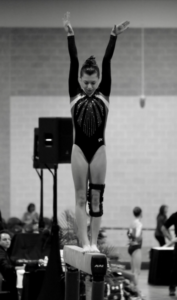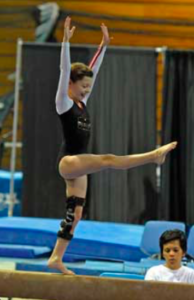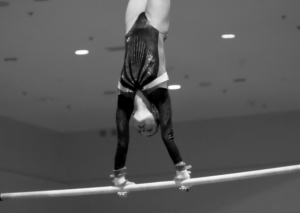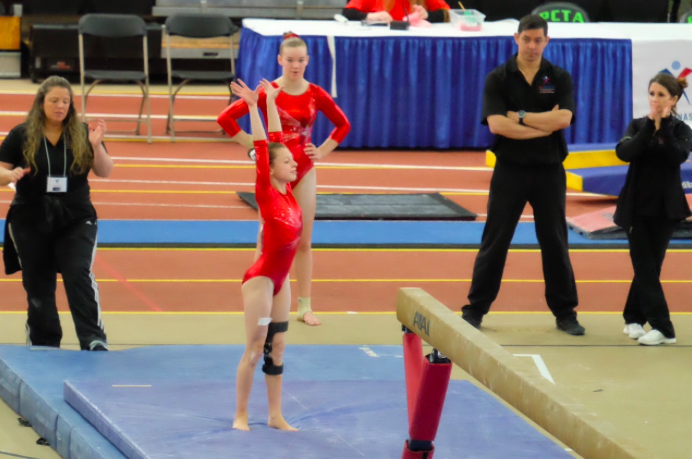The Reality of College Recruitment
How far is too far? For the past ten years, I have dedicated myself to gymnastics, a sport in which physical ability and mental capacity intertwine. All the extreme characteristics of other sports – strength, flexibility, agility, endurance and an intuitive conscious – combine to create the novel sport that I have been immersed and raised in for the majority of my life. But… has it been worth it?
I used to believe that gymnastics was about three C’s: courage, compassion and commitment.  Courage to overcome obstacles in everyday training, compassion towards your teammates and coaches on whom you depend to motivate and drive you forward, and finally commitment to a sport that is unlike any other. But over the years, it has become apparent that beyond all the joyous memories and victorious moments there is an overwhelming notion of sacrifice. Everyday after school I head straight over to the gym. I arrive home around 10:15 p.m. every night and must try to complete all my homework by a reasonable hour. This regiment is followed by a five-hour practice every Saturday morning. I am continuously pushing myself farther than what I believe to be my body’s limit, which leads to overuse and injury.
Courage to overcome obstacles in everyday training, compassion towards your teammates and coaches on whom you depend to motivate and drive you forward, and finally commitment to a sport that is unlike any other. But over the years, it has become apparent that beyond all the joyous memories and victorious moments there is an overwhelming notion of sacrifice. Everyday after school I head straight over to the gym. I arrive home around 10:15 p.m. every night and must try to complete all my homework by a reasonable hour. This regiment is followed by a five-hour practice every Saturday morning. I am continuously pushing myself farther than what I believe to be my body’s limit, which leads to overuse and injury.
Around the world, gymnasts of all ages deal with sacrifice. In China, young girls, once they begin to walk, are sent to rigorous practice institutions away from their home and family until they become olympians. Similarly, in Russia, young girls travel to Ozero Krugloye, a training center in the outskirts of Moscow, where the brutal weather is no match for what happens in the gym. In America, from a young age, girls who are deemed mentally and physically qualifiable by their coaches begin training not only for their yearly competitions but for Tops and Hopes, two similar programs meant to shine the spotlight on extraordinarily talented children.
I have been keeping to the same grueling schedule for most of my childhood and will continue to do so for the next three years. Practicing gymnastics does not just have a strain on my social and academic life, but it also takes a toll on a personal level; I see my coaches more than I see my family, and I am not the only one. Many of my teammates experience the same strains and pressures. The word sacrifice has been whispered out of the mouths of many of my fellow gymnasts, and while our coaches and parents try to understand what we endure daily, it almost always feels as though the idea of bodily and cerebral commitment can only be understood by a certain few; it’s as though we are within a secret society. We give up and let go of everyday normalities and share an esoteric value as if it is a customary standard.
In recent years, my coaches have believed it necessary and the natural progression to use my talent to give me leverage in the college phase of my life. Since seventh grade, I have been coached, not only on how to perform a routine, but also to know and master certain skills that are necessary for me to be noticed by collegiate coaches. One example is a single bar release- a skill performed on the uneven bars where a gymnast releases and re-catches the same bar.
In seventh grade, I was just beginning to think about high school; I was focused on being a well-rounded student, not a prodigy. Now, almost four years later, the alarming pressure is stronger than ever. I am in 10th grade, and while college is apparent, having to constantly hold myself to a higher standard so I can be recruited poses its challenges. Unlike my non-gymnast classmates, I must constantly be aware of where I stand in comparison to all the other gymnasts around the country.
Naturally, I want to do well in school, but because of the added pressure of college recruitment I must religiously keep my grades up.  I have to keep track of deadlines and specific requirements, such as standardized tests, that the colleges are looking for. Although most of the time I view the perspective of college gymnastics as a burden, there are some promises that have become apparent. First off, if I was to join a collegiate gym, the GPA that is normally needed to be accepted to that particular school would be lowered. Additionally, a routine check-up with the team’s physician, physical therapist as well as a masseuse would be mandatory and, as a perk, some schools assign personal tutors to each gymnast.
I have to keep track of deadlines and specific requirements, such as standardized tests, that the colleges are looking for. Although most of the time I view the perspective of college gymnastics as a burden, there are some promises that have become apparent. First off, if I was to join a collegiate gym, the GPA that is normally needed to be accepted to that particular school would be lowered. Additionally, a routine check-up with the team’s physician, physical therapist as well as a masseuse would be mandatory and, as a perk, some schools assign personal tutors to each gymnast.
It is even with these perks, that my daily training experience is dampened by the constant criticism of each and every one of my skills. My coaches no longer give me progressive and helpful corrections, but harsh criticisms of my person and my ability to perform. I am not worthy of any of my hard work if it does not pay off, and I am frequently made aware of that. I am no longer going to gymnastics for myself but for the idea of securing my future in a school that has no understanding of who I am as an individual. All that the colleges see are the tricks and flips that I perform, and that is enough to reassure or disappoint them.
I train Monday through Saturday, which comes to a fatiguing twenty-five hours a week. When I first joined the girls competitive gymnastics team at Chelsea Piers, there were twenty-three girls on my level. Now, ten years later the number has shrunk to an astonishing two. Over the ten years that I have dedicated myself to gymnastics, I have seen many athletes come and go. Some leave because of lack of interest, others because of numerous injuries making it impossible for them to continue. It is the reason that so many gymnasts leave, and the reason so few stay. The rigors of gymnastics are not for those who buckle under the pressure and, I can say from experience that those who have been a part of the team for as long as I have, give up or back down easily.
I have trouble making up my mind on whether or not being one of the last ones left on the team is something to feel proud of.  Traveling to and from gymnastics has begun to feel more like a requirement than an extra curricular, and although I have a deep rooted love and emotional connection to the sport, sometimes it is hard to imagine myself continuing. I have to confess to having many debates with myself about the reasons to stay or to quit. To this day, I make pro and con lists in my head, but every time I end up convincing myself how grit-less I would seem if I left, how much I would be leaving behind and how much I have yet to accomplish. I sometimes find it laughable how many times I have told my friends that I am going to quit or that I am never coming back. At the end of the day, there could be no me without gymnastics; it has utterly shaped who I am and who I will become. The natural competitiveness and fearless nature of the sport is truly unparalleled, and leaving it behind would mean giving up who I am.
Traveling to and from gymnastics has begun to feel more like a requirement than an extra curricular, and although I have a deep rooted love and emotional connection to the sport, sometimes it is hard to imagine myself continuing. I have to confess to having many debates with myself about the reasons to stay or to quit. To this day, I make pro and con lists in my head, but every time I end up convincing myself how grit-less I would seem if I left, how much I would be leaving behind and how much I have yet to accomplish. I sometimes find it laughable how many times I have told my friends that I am going to quit or that I am never coming back. At the end of the day, there could be no me without gymnastics; it has utterly shaped who I am and who I will become. The natural competitiveness and fearless nature of the sport is truly unparalleled, and leaving it behind would mean giving up who I am.
The ten years that I have practiced competitive gymnastics at Chelsea Piers have been fulfilling and worth while. The question now is whether I wish to continue in college. On one hand, I feel as though my whole gymnastics career has lead up to me being recruited for college, and if I do not satisfy that overarching goal it would be like I put myself through all the intense and demanding training for nothing. On the other hand, I wonder whether my body and mind can take another four years of fatigue and pain. I ask myself this question every time I walk into the gym. When I have a rough practice I leave the gym crushed and ready to quit. When practice is great I think of how I never want to leave. For now, I will take it a day at a time, but I know that in the near future I will have to come face to face with this life-changing decision.


Great article, Thea.
They communicate by way of telepathic communication.